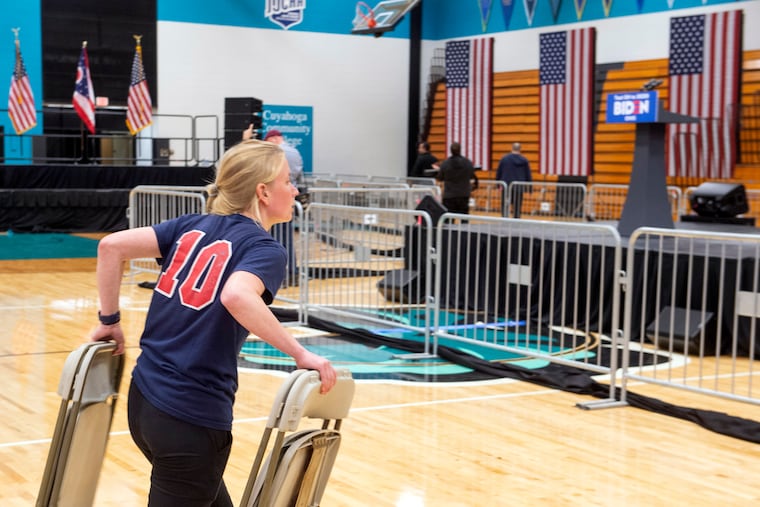Coronavirus is challenging underdog campaigns in the Pennsylvania primary election
Amid uncertainty fueled by the coronavirus pandemic, grassroots candidates with limited budgets are trying to determine whether they need to stretch their resources beyond the scheduled April 28 primary date.

The disruption caused by the coronavirus has created a lot of uncertainty for political campaigns.
For starters: When is the Pennsylvania primary election going to be held?
That question is top of mind for grassroots and non-incumbent candidates with limited budgets who are trying to determine whether they need to stretch their resources beyond the scheduled April 28 primary date.
“That has been the million-dollar question this week,” said Vanessa McGrath, a lawyer and Democrat who is challenging State Rep. Mary Isaacson in Philadelphia’s 175th District.
Some running in competitive primaries against better-funded candidates are moving ahead under the assumption that the election won’t change, committing to their pre-pandemic strategies for reaching voters with advertising and mail. Others are awaiting clarity from Harrisburg.
Gov. Tom Wolf, a Democrat, and the Republican-controlled legislature are poised to move the state’s primary election to June 2, but nothing is final yet.
Rescheduling would give county election officials more flexibility in consolidating polling places this year and make long-term changes allowed under a sweeping election law passed last year.
» READ MORE: Candidates are changing tactics for a coronavirus election of social distancing
Dean Browning, a Republican running for Congress in the Lehigh Valley, said Friday he was moving forward with his media strategy as planned. “I don’t see another option,” he said, noting that his primary opponent, Lisa Scheller, has been airing commercials for weeks.
Scheller, a manufacturing executive, raised $550,000 through the end of 2019, with more than half of that coming from personal loans, federal records show. Browning raised $300,000, including $165,000 in personal loans. They are running to try to unseat Democratic Rep. Susan Wild.
“I’m at a bit of a disadvantage there. I have a Republican opponent I will liken to our local version of Michael Bloomberg,” Browning said.
“Once you start your media campaign … you need to sustain that through the primary. And I gauged everything to start now to run through April 28," he said. “If it suddenly becomes Aug. 28, I’m at a severe disadvantage.”
Brett Burman, a health-care consultant who is running as a Democrat for a state Senate seat in Delaware County, said his campaign’s ground game was its biggest strength. “Obviously we’ve lost that at this point,” he said.
Instead of knocking on doors, he’s been calling voters and potential donors. But in recent days he stopped doing that, too.
“I felt as though people were a little overwhelmed over the past week,” Burman said Friday. “I just didn't think it was an appropriate time to be reaching out to people for electioneering purposes.”
Burman raised $240,000 through the end of 2019 — compared with $436,000 reported by his Democratic primary opponent, John Kane, business manager of Plumbers Local 690. The vast majority of Kane’s haul came from building trades unions.
The winner will challenge Sen. Thomas Killion (R., Delaware).
Since it’s harder now to contact voters in person, campaigns have to spend more money to reach them, Burman said.
Not knowing when the election will be held, he said, has “forced us to go into something of a holding pattern.”
There are other fundraising challenges. High-income donors who regularly contribute more than $1,000 to multiple campaigns may well continue to do so.
But grassroots campaigns tend to rely on smaller contributions. And donors who give between $100 and $1,000 are “really hit or miss right now,” said a Philadelphia-based Democratic fundraiser.
Many of those donors end up getting solicited by multiple campaigns. And with everyone stuck at home, they are getting bombarded with phone calls.
Some worry they might stop answering soon.
Not to mention, many people are out of work or otherwise uncertain about their finances. “You’re not going to ask everyone for resources right now,” said Nina Ahmad, a former deputy mayor of Philadelphia, who’s running for auditor general in the six-candidate Democratic primary.
But candidates with shoestring budgets are going to need more money if the election is postponed. Paying campaign staff for an additional month can be a significant expense. And routine things like getting physical checks from contributors is taking longer for some.
To be sure, lots of people holed up in their homes are bored. Some are happy to get a phone call from the outside world.
“We ask people, ‘How are you doing?’ It’s nice to just check in on your neighbors and let them have some outside contact,” said McGrath.
“This is a state-level race, so I’m calling people who are my neighbors,” she said. “Most people have been happy to have someone to chat with.”
She has thought about other potential logistical hurdles. The other week, McGrath placed an order for campaign literature. She wondered whether the companies that print the literature would be permitted to operate, given the governor’s decision ordering non-"life-sustaining" businesses to close.
Wolf later clarified the order to include an exemption for printers. But even if print shops stay open, they might not be able to meet the demand for electioneering mailers, which has increased because it’s harder for campaigns to meet with voters face to face.
Some underfunded candidates might be better equipped to adjust to changing circumstances. Candidates backed by the Working Families Party can rely on that group’s peer-to-peer texting program and other infrastructure, for example.
“If the elections are pushed back, that will enable us to reach out to more voters,” said Vanessa Clifford, political director for the Working Families Party, which helped elect Kendra Brooks to Philadelphia City Council last year. “It will be easy enough for us to switch tactics."